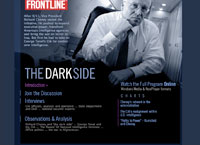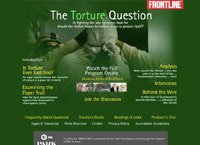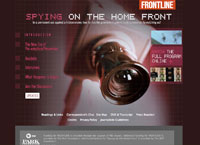More on the key figures and controversies surrounding Vice President Cheney's efforts to expand the power of the executive branch.
Cheney and His Legal Minds The Bush Administration's Expansion of Presidential Power Bringing the Executive Branch In Check Is a Powerful Presidency Good for America?
Related FRONTLINE Reports
Cheney and His Legal Minds
To learn more about the man many consider to be the most powerful vice president in our nation's history, here's a quick biographical overview -- "The Cheney Factor"-- from U.S. News & World Report. Reporter Kenneth T. Walsh lays out the upbringing, education and career moves that brought Cheney from Casper, Wyo. to Washington and helped forge his identity as the "intellectual godfather" of executive power in the Bush White House.
"Angler: The Cheney Vice Presidency" is a rich, four-part June 2007 Washington Post series -- drawn from more than 200 interviews -- that profiles Cheney and his impact on the executive branch. Part one explores Cheney's "different understanding with the president" about his role. Part two examines his sustained dedication to strengthening the president's power and how that philosophy shaped crucial decisions in the wake of 9/11. Parts three and four focus on Cheney's influence beyond the realm of national security, revealing how he has quietly become "the dominant voice on tax and spending policy" and used his vice presidential power to "undercut long-standing environmental regulations for the benefit of business."
Want to explore Cheney's political philosophy in his own words? Start with this collection of excerpts from some of his writings and statements over the past 20 years on the subject of executive power, published as part of FRONTLINE's 2006 report The Dark Side. And read this 1996 interview with FRONTLINE for The Gulf War, in which Cheney explains why President George H.W. Bush had the authority to take military action, without congressional approval, against Iraq after it invaded Kuwait.
For more on the legal team that has championed Cheney's view on presidential power, read "The Hidden Power," a 2006 New Yorker profile of David Addington, the hard-nosed lawyer who was Cheney's counsel and now is his chief of staff. Reporter Jane Mayer profiles a man known for jealously guarding his privacy, drawing on interviews with his friends who praise him for making national security "a personal mission" and opponents who've nicknamed him "Cheney's hit man."
In 2006, Washington Post writer Peter Slevin profiled John Yoo, the Office of Legal Counsel lawyer -- nicknamed "Dr. Yes" by his boss, Attorney General John Aschroft -- who teamed up with Addington and Cheney to engineer the legal justifications for expanding presidential power. "I think people don't understand how difficult was the work we did," says Yoo, "and how difficult the questions, how recent the 9/11 attacks were." For more, read two recent FRONTLINE interviews with Yoo: his account of the context and logic behind some of his most significant memos is in this interview from 2005's The Torture Question; and his description of his role in developing the president's domestic wiretapping program and why he believes the program is constitutional is in this 2007 interview from Spying on the Home Front.
For a profile of a top legal adviser who found himself at odds with the White House read "Conscience of a Conservative," a New York Times Magazine cover story on Jack Goldsmith. As head of the Office of Legal Counsel he refused to uphold the reasoning used by Yoo and Addington to justify expansive presidential power. Reporter Jeffrey Rosen sketches Goldsmith's path from academia to secretive meetings in the vice president's office, and Goldsmith explains why he now feels compelled to speak out about what he witnessed.
The Bush Administration's Expansion of Presidential Power
For a big picture, this New York Review of Books article by Elizabeth Drew offers a critical overview of the tactics and arguments the Bush administration has marshaled to support its amassing of presidential power. Drew unravels the concept of the "unitary executive" -- a cornerstone of Yoo's stance favoring nearly unlimited executive authority -- and chronicles the "unprecedented secrecy" in pursuit of expanded power that has even some conservatives concerned about a future of autocratic presidents.
A pair of documents issued within two weeks of the Sept. 11 attacks laid the groundwork for the administration's push to expand executive authority. Start with the Sept. 14, 2001 congressional resolution that authorized the president to use military force to respond to the attacks. A key phrase in the resolution granting the president power "to use all necessary and appropriate force" became central to the legal reasoning that buttressed subsequent decisions expanding the president's power to conduct a war on terror. These arguments were further developed in this Sept. 25 John Yoo memo, which concludes that Congress cannot "place any limits on the president's determinations as to any terrorist threat, the amount of military force to be used in response, or the method, timing and nature of the response. These decisions, under our Constitution, are for the president alone to make."
Two key showdowns between Congress and the administration over executive power were the debates over interrogation policy and the NSA's warrantless wiretapping program. To follow the torture controversy, read the original "torture memo" (PDF) authored in the wake of 9/11, which authorized harsh treatment of suspected terrorists and stipulated that only acts that intentionally result in physical pain "equivalent in intensity to the pain accompanying serious physical injury, such as organ failure, impairment of bodily function, or even death" are tantamount to torture. In December 2004, the Justice Department disavowed that memo as support grew for Sen. John McCain's (R-Ariz.) anti-torture bill.
The McCain bill drew attention to signing statements, addenda tacked onto legislation at the time the president signs it into law. To learn more about the roots and implications of these statements, start with the 2006 Boston Globe article "Bush Challenges Hundreds of Laws" by Charlie Savage; it triggered the Globe's subsequent Pulitzer Prize-winning investigative series into the reach and content of what has become a key tool in the administration's arsenal. Read examples of the statements here and read the American Bar Association's report (PDF) on the practice, which found signing statements to be "contrary to the rule of law and our constitutional system of separation of powers."
But Bush's signing statement -- an end run around the McCain torture legislation, didn't end the debate over the administration's interrogation policies. An Oct. 4, 2007 New York Times article revealed the existence of more secret memos written with the explicit intention of avoiding limitations imposed by Congress. These executive branch memos, uncovered by reporters Scott Shane, David Johnston and James Risen, argued for the continued use of harsh interrogation tactics such as "waterboarding" and reasoned that such practices did not merit classification as "cruel, inhuman or degrading treatment," the language Congress adopted in McCain's Detainee Treatment Act of 2005.
To follow the White House-Congressional battle on another front -- warrantless wiretapping -- begin by reading the December 2005 New York Times article that first reported the existence of the eavesdropping program and the USA Today article that six months later revealed the NSA was also gathering phone records from service providers. Vice President Cheney countered the Times report by telling members of the press that Congress had granted the president authority to conduct the program under the Sept. 14, 2001 authorization to use military force (AUMF). Democratic members of Congress balked, and Tom Daschle (D-S.D.), who was Senate majority leader at the time that Congress passed the AUMF, wrote "Power We Didn't Grant," a Washington Post editorial arguing that the resolution was not meant to allow the type of program that had come to light. On Jan. 19, 2006, the Justice Department issued this detailed 42-page defense (PDF) of the president's authority to conduct domestic surveillance -- the arguments are neatly summarized in this New York Times piece. For a good overview of the arguments made against presidential authority to run this type of program, read this open letter to Congress written by a group of "scholars of constitutional law and former government officials" and printed in the New York Review of Books; it offers a point-by-point rebuttal of the Justice Department's defense of the program. Recently, Bush has chosen to defray criticism of the wiretapping program by working with Congress. In September 2006 he began calling for Congress to officially authorize the program; read about legislation passed in August 2007 that effectively legalized Bush's domestic surveillance activities.
Bringing the Executive Branch In Check
Is the Bush administration's accretion of executive power constitutional? The Supreme Court to date has not answered this question definitively, but in its decisions about the treatment of detainees, it has delivered a series of tempered rebukes. In 2004, the court ruled in Hamdi v. Rumsfeld that holding an American citizen accused of being a terrorist indefinitely without charging him with a crime or allowing access to a lawyer violates his right to due process. The decision in Rasul v. Bush, issued on the same day as the Hamdi decision, found that the writ of habeas corpus -- the right of a prisoner to appear in court to contest his imprisonment -- applies even to individuals who aren't American citizens. The most serious blow came in a third decision from 2006, Hamdan v. Rumsfeld, in which the court held that the military commissions created by Bush needed congressional approval and must comply with both the Geneva Convention and the Uniform Code of Military Justice.
The administration responded to the Hamdan decision by publicly stating that detainees would be subject to the Geneva Conventions, but also successfully lobbying Congress to pass the Military Commissions Act of 2006, which mitigated the effect of the Supreme Court's rulings by codifying rules for treating terror detainees and getting Congress' approval to suspend habeas corpus in the case of most terror suspects. This article in The Nation explores some of the reasons why Hamdan fell short of being the victory critics of the administration thought they'd secured.
In both the detainee treatment and wiretapping debates, Congress has passed laws -- the aforementioned Military Commissions Act and this legislation -- approving the president's expanded powers. In this article from the New York Times Magazine, law professor Noah Feldman explains what Congress could do to recalibrate the balance of power. After putting Bush's actions in context as part of a long historical progression toward a strong executive branch, Feldman makes the case that the judicial branch is unlikely to substantially restrict Bush in the near future, but he sees the potential for Congress to reinvigorate its oversight responsibilities and strengthen its own role, scrutinizing claims to "executive privilege" and enacting consequences to counterbalance the president's power.
Is a Powerful Presidency Good for America?
For opinions in favor of a powerful presidency, start with John Yoo's Sept. 17, 2006 New York Times editorial arguing that the measures taken by Bush's administration merely restore the presidency to the level of power it enjoyed before Nixon -- a level of power essential to effectively combating the threat of terrorism. Paul Starobin of the National Journal argues that the "imperial presidency" is nothing new, tracing examples back through the administrations of Hamilton, Truman and Nixon. In the context of the "war on terror" and a conservative Supreme Court, Starobin argues, presidential power is likely to remain strong and unchallenged into the future. Scholar Harvey C. Mansfield puts the strong executive in constitutional context in this Wall Street Journal op-ed and suggests a powerful presidency provides vital "energy" for confronting a dynamic environment and achieving "greatness" as a leader.
But the Bush administration's executive power push has drawn criticism from observers of all political stripes. In 2004, Human Rights Watch issued this report denouncing Bush for putting himself "above the law;" it catalogs a litany of human rights abuses stemming from White House decisions. In the liberal magazine The American Prospect, Deborah Pearlstein makes the case that Bush's "power grab" does more harm than good for national security by creating new enemies around the globe.
From the right, David Boaz of the Cato Institute decries the constitutional imbalance created by concentrating authority with the president in his piece, "Dividing Power." Bruce Fein, who served as an associate deputy attorney general under President Reagan, has become a vocal critic of the Bush administration, arguing for Congress to "Restrain This White House" in 2006 and, more recently, debunking the theory of "executive privilege" cited by Cheney and others in their refusal to comply with congressional subpoenas. High-profile conservative strategist Grover Norquist has also gone on record opposing Bush's bypassing of Congress; he voices concern about precedents a future Democratic president might be able to exploit.
home . introduction . watch online . interviews . themes . join the discussion
producer's chat . readings & links . site map . dvd & transcript . press reaction
teacher's guide . credits . privacy policy . journalistic guidelines . FRONTLINE series home . wgbh . pbs
posted october 16, 2007
FRONTLINE is a registered trademark of wgbh educational foundation.
main photograph © corbis, all rights reserved
web site copyright WGBH educational foundation


